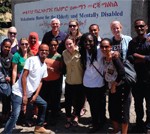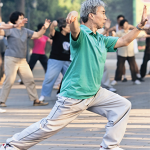NEW YORK (Reuters Health)—”Booster sessions” with a physiotherapist help older adults with osteoarthritis keep doing their exercises, a new systematic review and meta-analysis suggests. “There is strong evidence for the benefits of exercise for people with osteoarthritis or chronic low back pain. However, multiple studies have shown adherence to exercise declines over time, and the…
Similar Outcomes with Early or Late Mobilization After Rotator Cuff Repair
NEW YORK (Reuters Health)—Early or late mobilization after rotator cuff surgery appears to yield similar outcomes, according to a new meta-analysis. Dr. Bruno Fles Mazuquin from the University of Central Lancashire in the U.K., and colleagues conducted an overview of systematic reviews comparing the effectiveness of early and conservative rehabilitation after rotator cuff repair. The…
Does Telephone Coaching Enhance Physical Activity Programs?
Health coaching by telephone is increasingly being used to assist in chronic disease self-management. A recent study examined the benefits of simultaneous health coaching via telephone as an addition to a physiotherapist-prescribed home-based physical activity program for patients with knee OA. Although participants receiving additional coaching had a short-term improvement in adherence, changes in pain and function did not differ between the study’s groups at six months…

Treating the Athlete: New Thoughts on How to Prevent & Treat Arthritis in Athletes & Raise Their Awareness
All athletes—amateur and professional—should understand their risks for developing injury-related arthritis. Rheumatologists and other physicians at the Hospital for Special Surgery in New York take a rapid approach to treating athletes, often considering intense physical therapy, innovative treatments and surgery much sooner than for the average patient—all to keep joints healthy and enable athletes to play for as long as possible…

Is Arthroscopic Meniscal Surgery Effective?
A recent review examined the effectiveness of arthroscopic mensical surgery in treating meniscal injuries. Researchers determined that little evidence exists to support the use of arthroscopic meniscal surgery and more studies that directly compare it with nonoperative treatments are needed…
Conservative vs. Surgical: What Influences OA Treatment Choices?
Prior research has found that the use of surgery to treat osteoarthritis is increasing, while more conservative treatments, such as physical therapy, are underused. This disparity drove researchers to examine what influences a patient’s treatment choice. They found that a treatment’s characteristics—including a patient’s expectations for effectiveness and risk—affect decision making. Other influences: personal investment and circumstances, as well as support and advice from social networks and healthcare providers…

Carpal Tunnel Syndrome: Is Post-Surgical Rehabilitation Helpful?
A recent research review compared the results of various studies on rehabilitation treatments, including immobilization, exercise and cold therapy, for patients with carpal tunnel syndrome after surgery. The authors concluded that little evidence supports the effectiveness of rehabilitation techniques, and many of the studies reviewed have similar limitations…

Rheumatologists, Physical Therapists Partner to Offer Patients Pain Relief, Improved Quality of Life
When rheumatoid arthritis (RA) left Stefanie Gluckman fighting chronic pain and relegated to a wheelchair, she turned to Lori Rubenstein Fazzio, DPT, PT, MAppSc, YTRX, of Mosaic Physical Therapy in Los Angeles, for relief. Dr. Rubenstein Fazzio knows what it’s like to suffer from excruciating pain. After sustaining career-threatening injuries in a horseback accident in…

American Physical Therapists Collaborate with Local PTs in Ethiopia
Ethiopia has a rich, variable and distinguished history and landscape. Located in the Horn of Africa, it shares borders with Eritrea, Djibouti, Somalia, Kenya, Sudan and South Sudan. Ethiopia has claim to the oldest humanoid fossils, named “Lucy,” which were discovered in 1974 and are estimated to be 3.2 million years of age.1 The country’s…

Exercise Guidelines for Fibromyalgia Patients
Fibromyalgia syndrome (FMS) is a condition characterized by widespread pain, abnormal pain processing, sleep disturbance and fatigue. It is commonly associated with psychological distress and co-morbid conditions. Impaired cognition is common in individuals with FMS, and is often referred to as fibrofog.1 According to the U.S. Centers for Disease Control and Prevention, the prevalence of…